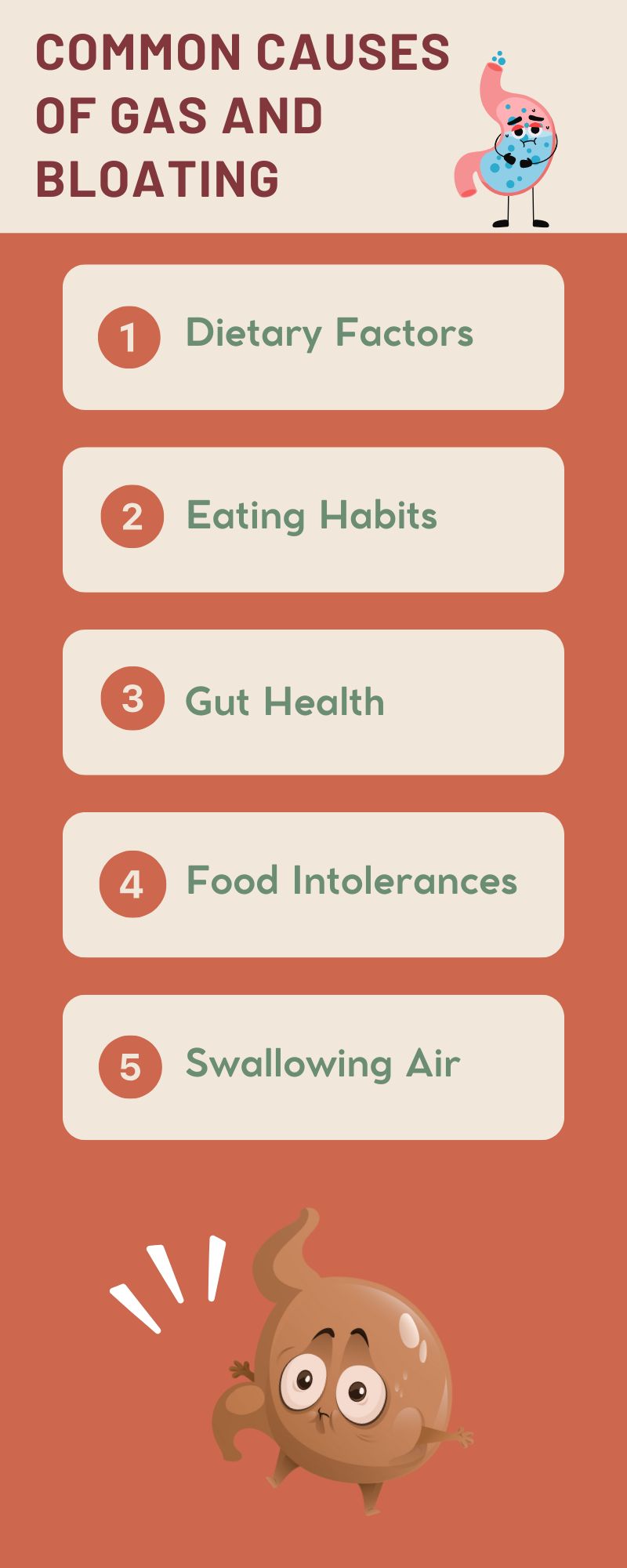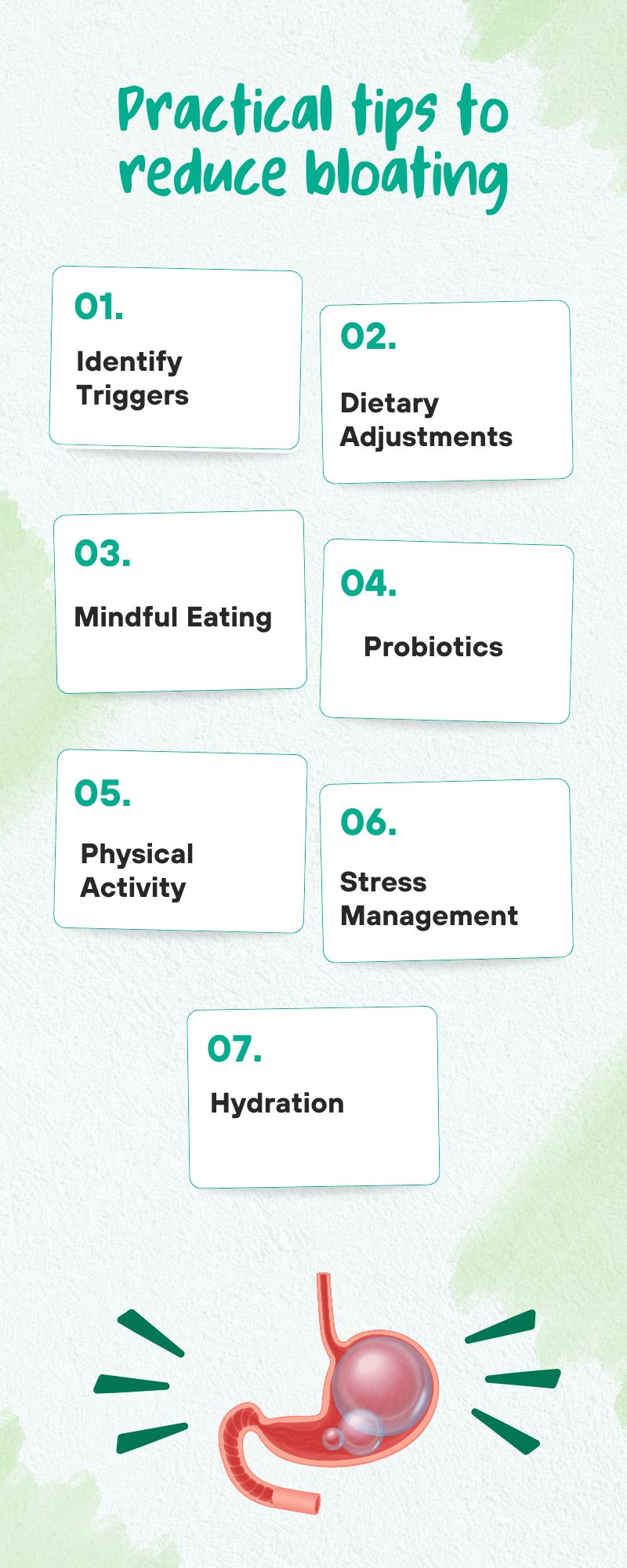If you’ve ever found yourself saying, “Everything I eat gives me gas and bloating,” you’re not alone. It's an all-too-common frustration that many people face daily.
Whether it's after a big meal or even a light snack, the discomfort of bloating and gas can make you feel like something’s off inside your body.
It’s easy to blame ourselves, thinking we’ve done something wrong or that we have a "weak" digestive system. But the truth is, your body is simply reacting to the foods you eat and how they interact with your gut. The real culprit may not be your willpower but a combination of factors that influence digestion, from the foods you choose to your eating habits.
This blog will explore the common causes behind gas and bloating after eating and, more importantly, how you can address them to feel better.
Key takeaways
-
Certain foods, like beans, lentils, and cruciferous vegetables, can ferment in the gut, causing excess gas and bloating
-
Eating too quickly and overeating can overwhelm your digestive system, leading to bloating and discomfort
-
Managing stress and staying active helps improve digestion, reducing the likelihood of bloating after meals
-
Hydration and mindful eating are key practices to support smoother digestion, while probiotics (such as The Good Bug’s products) can promote gut health and reduce bloating
Understanding the digestive process
Your digestive system works to break down food and absorb nutrients, but sometimes it doesn’t go smoothly. When food enters your stomach, it’s mixed with digestive juices. By the time it reaches the small intestine, most nutrients are absorbed; however, some foods, especially those high in fiber or sugar, pass through the large intestine undigested.
Here, bacteria in the gut ferment these foods, creating gases that can lead to bloating. A healthy gut can handle this, but if your gut balance is off due to diet, stress, or other factors, this process can cause excess gas and discomfort.
Also, watch How Your Gut Microbiome Impacts Overall Health - Insights by Consultant Monique Jhingon
Understanding how your digestive system works helps you figure out what might be causing the bloating and how to address it.
Common causes of gas and bloating

Gas and bloating after eating can be caused by a variety of factors, and understanding these causes can help you pinpoint what might be triggering your discomfort.
1. Dietary factors
What you eat plays a significant role in how your body reacts. Certain foods are more likely to cause gas and bloating due to the way they’re digested.
For example, high-fiber foods like beans, lentils, and whole grains are excellent for overall health but can ferment in the gut, producing excess gas. Similarly, fatty foods can slow down digestion, leading to a feeling of fullness and bloating.
2. Influence of eating habits
The way you eat matters, too. Eating quickly or overeating can overwhelm your digestive system, making it harder for your body to break down food properly.
Large meals, especially those high in fat or sugar, can slow down digestion, causing food to linger in the stomach and intestine longer than it should.
3. Impact of gut health and digestive disorders
Sometimes, the root cause of bloating and gas lies in gut health. Conditions like irritable bowel syndrome (IBS), small intestinal bacterial overgrowth (SIBO), or even an imbalance in gut bacteria can disrupt digestion, making you more prone to bloating and discomfort.
These conditions can affect how your body processes food, leading to excess gas production or slow digestion.
4. Food intolerances and allergies
Food intolerances, such as lactose intolerance or gluten sensitivity, can be significant contributors to gas and bloating.
If your body struggles to digest certain proteins or sugars, like those found in dairy or wheat, you may experience uncomfortable bloating and gas after meals.
5. Effect of swallowing air (aerophagia)
Swallowing air while eating or drinking is another factor that can lead to bloating. Whether it’s from eating too quickly, drinking carbonated beverages, or chewing gum, the extra air that enters your digestive system can accumulate, causing a bloated feeling.
Specific foods that cause gas and bloating
While everyone’s digestive system is different, some foods are more likely to cause issues for most people:
|
Food type |
Examples |
Effect on digestion |
|
High-fiber foods |
Beans, lentils, whole grains |
Can ferment in the gut, causing gas |
|
Sugary and fatty foods |
Candy, cookies, fried foods |
Slow digestion, leading to bloating |
|
Cruciferous vegetables |
Broccoli, cabbage, cauliflower |
Fermentation in the gut produces gas |
|
Carbonated beverages |
Soda, sparkling water |
Introduce extra gas into the stomach |
|
Artificial sweeteners |
Sugar-free gum, candies, and drinks with sorbitol |
Difficult to digest, leading to bloating |
|
Dairy products |
Milk, cheese, yogurt |
Lactose is hard to digest, causing bloating |
Are you experiencing acidity, bloating, or constipation due to an unhealthy gut? Watch Jamie Liver's story of defeating these problems with our 14-day gut cleanse kit.
Lifestyle factors contributing to bloating
It’s not just what you eat that affects your digestion; your lifestyle plays a significant role in how your body processes food. Stress, physical activity, and even your sleep habits can all contribute to bloating and discomfort after meals.
1. Stress and anxiety
Did you know that stress can mess with your gut? When you’re stressed or anxious, your body enters fight-or-flight mode, which can slow down digestion and lead to bloating.
The gut-brain connection is real, and when you’re stressed, your body releases hormones that can affect your digestive system. This can lead to gas buildup and discomfort.
2. Lack of physical activity
Regular movement is vital for your digestive health. When you sit or lie down for long periods, digestion can slow, and gas can build up in your stomach.
Simple activities like walking after a meal can stimulate your digestive system, helping to release trapped gas and reduce bloating. Physical activity promotes the movement of food through your intestines and aids the natural digestive process.
3. Poor sleep habits
Not getting enough sleep? Your digestive system might suffer. Poor sleep disrupts your circadian rhythm, which affects digestion. When you’re sleep-deprived, your body struggles to maintain normal digestive function, leading to bloating and discomfort.
A lack of sleep also affects your stress levels, which can compound the digestive issues.
Also read: Bloating: Causes, Symptoms, Tips And Remedies
Practical tips to reduce bloating

The good news is that you don’t have to just put up with bloating and gas. There are many practical strategies that can help reduce or even prevent these uncomfortable symptoms. Here are some actionable tips to get you started:
1. Identify personal triggers: Keep a food diary to track what you eat and how you feel afterward. This helps identify patterns and eliminate problem foods
2. Dietary adjustments: If certain foods cause bloating, try a low-FODMAP diet and consult a professional to ensure you're meeting your nutritional needs
3. Mindful eating: Eat slowly and chew thoroughly to improve digestion. Avoid distractions like screens to focus on your meal
4. Incorporate probiotics: Add probiotic-rich foods like yogurt and kefir to balance your gut bacteria. Supplements can also be beneficial
The Good Bug’s Bye Bye Bloat probiotic contains Bifidobacterium Longum W11, a strain known to improve digestion by reducing harmful bacteria and supporting gut flora balance, which helps ease abdominal pain, bloating, and gas.
5. Regular physical activity: Exercise for 30 minutes a day, and take a short walk after meals to stimulate digestion and reduce bloating
6. Stress management: Practice meditation, deep breathing, or yoga to reduce stress and improve gut health
7. Hydration: Drink plenty of water to support digestion, prevent constipation, and reduce bloating. Herbal teas like peppermint or ginger can also soothe the digestive system
To further relieve constipation and support overall gut health, consider The Good Bug's Smooth Move Fiber Boost.
When to seek medical advice
While occasional bloating and gas are common and usually nothing to worry about, persistent or severe symptoms can sometimes signal a more serious underlying issue.
Signs to look out for
If you experience any of the following symptoms along with bloating, it’s important to seek medical advice:
-
Severe abdominal pain: Intense or sharp abdominal pain that doesn’t go away or worsens should be evaluated
-
Unexplained weight loss: Losing weight without trying, especially if it’s coupled with digestive discomfort, could be a sign of a more serious condition
-
Blood in stool: If you notice blood in your stool or black, tarry stools, it’s crucial to seek medical attention immediately
-
Frequent diarrhea or constipation: A significant change in bowel habits, such as frequent diarrhea or constipation, can indicate digestive issues that need professional assessment
Bloating and gas after meals can be frustrating, but understanding the causes and taking simple steps to manage them can bring relief. Small changes in your eating habits, lifestyle, and self-care routine can make a big difference.
Ready to say goodbye to bloating? Explore our range of gut-friendly products at The Good Bug and enjoy smoother digestion with every meal.
FAQs
1. Why do I feel bloated after every meal?
Frequent bloating can result from various factors, including food intolerances (such as lactose or gluten), high-fiber diets, or digestive conditions like irritable bowel syndrome (IBS).
2. How can I prevent bloating after eating?
To reduce bloating, consider eating slowly, avoiding carbonated beverages, and limiting high-fat or high-fiber foods. Regular physical activity and stress management also play crucial roles.
3. Are there specific foods that cause bloating?
Yes, foods like beans, lentils, cruciferous vegetables (e.g., broccoli, cabbage), dairy products, and carbonated drinks are common culprits.
4. When should I consult a doctor about bloating?
Seek medical advice if bloating is persistent, accompanied by severe abdominal pain, unexplained weight loss, or changes in bowel habits.
 NEW LAUNCH
NEW LAUNCH

